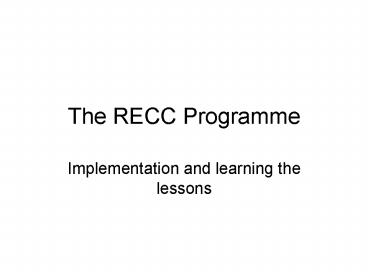The RECC Programme - PowerPoint PPT Presentation
1 / 13
Title:
The RECC Programme
Description:
Much is shared, which can be summarised in the 10 Essential Shared ... and how to implement them properly' (Brach & Fraser 2000) cited in Bennett J (2006) ... – PowerPoint PPT presentation
Number of Views:48
Avg rating:3.0/5.0
Title: The RECC Programme
1
The RECC Programme
- Implementation and learning the lessons
2
Aims Provide a historical context to
RECC Place RECC in context of other Race
Equality training Provide information on other
national implementation programmes
3
SHARED CAPABILITIES OF PRACTITIONERS
- Much is shared, which can be summarised in the 10
Essential Shared Capabilities (ESC) - Working in partnership
- Respecting Diversity
- Practising Ethically
- Challenging Inequality
- Promoting Recovery
- Identifying Peoples needs and strengths
- Providing service user centred care
- Making a difference
- Promoting safety and positive risk taking
- Personal Development and learning
4
(No Transcript)
5
(No Transcript)
6
Delivering Race Equality 12 Characteristics
- The vision for DRE is that by 2010 there will be
a service characterised by - Less fear of mental health services among BME
communities and service users - Increased satisfaction with services
- A reduction in the rate of admission of people
from BME communities to psychiatric inpatient
units - A reduction in the disproportionate rates of
compulsory detention of BME service users in
inpatient units - Fewer violent incidents that are secondary to
inadequate treatment of mental illness - A reduction in the use of seclusion in BME
groups - The prevention of deaths in mental health
services following physical intervention
7
- More BME service users reaching self-reported
states of recovery - A reduction in the ethnic disparities found in
prison populations - A more balanced range of effective therapies,
such as peer support services and
psychotherapeutic and counselling treatments, as
well as pharmacological interventions that are
culturally appropriate and effective - A more active role for BME communities and BME
service users in the training of professionals,
in the development of mental health policy, and
in the planning and provision of services and - A workforce and organisation capable of
delivering appropriate and responsive mental
health services to BME communities.
8
Bennett, J (2006) Achieving Race Equality Through
Training a Review of Approaches in the
UK.Journal of Mental Health Workforce
Development (Vol. 1. pp 5 11)
Multi-Cultural Training Learning about different
cultures did little to address injustice
and discrimination Racism Awareness Training
Focus on individual responsibility with little
attention paid to organisation structures
and policies which perpetuated racist
practice Equal Opportunities Training Wider
remit to include needs of diverse groups e.g.
disabled people. Training was factual
and legislation driven Cultural Competence
Training Proposed in the DRE although there
are a number of models aimed at
supporting organisations and their people to
deliver systems to meet the needs of
different racial and ethnic groups. Note
Learning about the needs of ethnic groups
can lead to stereotyping! These things are
dynamic!!
9
But what about the evidence?
- The conclusions drawn were that the competence
training shows signs of promise as a strategy for
improving the knowledge, attitudes and skills of
health professionals. However evidence that it
improves patient adherence to therapy, health
outcomes and equity of services across racial and
ethnic groups is lacking health systems have
little evidence about which cultural competence
techniques are effective and less evidence on
when and how to implement them properly (Brach
Fraser 2000) cited in Bennett J (2006).
10
Therefore..
- Training is not the answer!
11
The Aims of the Essential Shared Capability Race
Equality and Cultural Capability (RECC) training
programme
'The RECC learning materials are designed to help
learners develop knowledge and understanding of
racism, cultural difference and recognise the
impacts of discrimination. The learning
materials will also enable workers to develop
their practice skills in promoting race
equality, working positively with cultural
difference and effectively dealing with the
impacts of discrimination on individual and
institutional levels'.
12
Table 1. Suggested Criteria for RECC Trainers
13
RECC Training
- 12 modules
- 2 - 3 hours per module
- Considerable time investment
- Pre-reading available
- Work task orientated
- Pressure points
- Knowing the materials is essential
- Knowing how to teach the materials is essential
- On-going development highly desirable.























![Get easy {[MIBM GLOBAL]} 2 years MBA programme PowerPoint PPT Presentation](https://s3.amazonaws.com/images.powershow.com/8868120.th0.jpg?_=20170706022)







![Contact {[{969:090:0054}]} Online MBA Programme –MIBM GLOBAL PowerPoint PPT Presentation](https://s3.amazonaws.com/images.powershow.com/8828988.th0.jpg?_=20170429056)